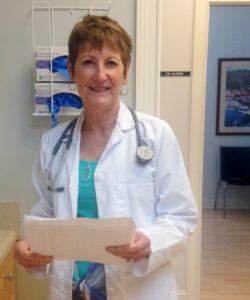
COVID-19: What’s next?
The good and the bad, from a Bluffton infectious disease expert
Buckle up, we’re in for a long and eerie ride with the COVID-19 pandemic.
That’s medical advice from a local doctor who ought to know — Dr. Kathleen Casey of Bluffton.
She is the new medical director at the Greater Bluffton Jasper County Volunteers in Medicine, which uses retired professionals to offer free medical care to the underserved or uninsured.
She wrestled with HIV, SARS, the H1N1 “swine flu,” and Ebola. Beyond helping patients, she was the infectious disease epidemiologist charged with protecting the 646-bed hospital.
We talked Monday about what to expect next with the coronavirus that has swept its way from China to Beaufort County.
Some of her thoughts:
LONG DISTANCE
We have proven to be trainable in keeping our social distance, and not touching each other.
It’s a big change, but it will last.
“Isolating from one another is going to be critical for our survival.”
Right now, the top priority is to keep hospitals functioning, and this is our way of reducing a sudden demand.
“The biggest fear is that we’ll run out of resources in the health care system: protective gear for the staff, the good health of the staff, intensive-care-unit beds, and ventilators.”
MOTHER OF INVENTION
We will develop new ways of doing traditional things. Ministers are delivering sermons by video. People are working at home. A presidential debate with no audience was perhaps more effective.
“We may learn all sorts of lessons, and certain things will be better. You never know.”
Veterans Administration hospital beds will be used by civilians.
Buildings will be repurposed for hospitals. Temporary structures could be built to house patients.
“It’s like a battlefield triage situation.”
SCHOOL’S OUT
It’s too early to tell how long school will be discontinued. But we have no data to say for sure that children are, or are not, reservoirs for the virus, because patients without the symptoms are not being tested in the United States.
The hope is that children would not transfer the virus to their grandparents or parents, but don’t look for any data to prove it anytime soon.
MORE RESTRICTIONS
“One of the concerns is that when Italy shut down, people just bypassed the roadblocks.
“We may have to become more stringent as the days go on in how we maintain our social isolation.
“I think we’ll see more restrictions, not less.”
A TABLE FOR FOUR
“I don’t think sitting down to eat in a restaurant will come back anytime soon, but they may not ban drive-throughs or take-outs.”
A BIG TEST
Testing for COVID-19 will have to change.
It makes no sense to require sick people to go to a doctor’s waiting room to get an order to be tested. That’s the current setup, but drive-through testing will have to be available to all comers.
That will require more labs, and the private sector will respond.
Right now, a health care worker can get flu symptoms and be taken out of service for 14 days, without ever being tested for the coronavirus.
THINK LOCAL
“Each state is going to have to fight its own battles. Look at Seattle and New York. They clearly are making their own decisions to help solve it themselves based on their local resources.”
BREATHE DEEP
One thing is for certain: “It will require an amazing amount of patience on the part of everyone.
“It is absolutely terrifying to everyone. The trickle-down impact on the economy is mind-boggling.
“It is contextually beyond anyone’s life experience, including my own. We don’t have anything we can liken it to. We’re taking this each day in small bites. We cannot digest it all.
“We have the hurricane or blizzard mentality. There is something huge coming that will be earth-shattering for a while, and then it will move on.
“This will go on for who knows how long. I assume the Centers for Disease Control will give us the guidance as to when the crisis has passed.
“The virus isn’t going to disappear off the face of the earth. The virus may continue to circulate for months, but in much smaller numbers, where it will not overwhelm our system.”

